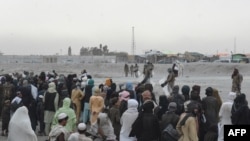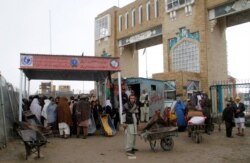Afghanistan's Taliban insurgents closed a major crossing point Friday for travel and trade with Pakistan, demanding the neighboring country end the alleged mistreatment of Afghan travelers and ease other restrictions.
The abrupt closure of the busy Spin Boldak crossing into the southwestern Pakistani town of Chaman has stranded hundreds of travelers and trucks carrying commercial goods in both directions, according to traders and witnesses.
The Taliban's swift battlefield advances against Afghan government forces since early May have enabled them to seize control of dozens of districts across the conflict-hit country, including most of landlocked Afghanistan's trade crossings with neighboring countries.
They include Iran, Tajikistan, Turkmenistan and Pakistan. The loss of these trade routes is estimated to have cost the Afghan government tens of millions of dollars in revenues.
Taliban spokesman Zabihullah Mujahid defended the move, alleging Afghan travelers are being mistreated by the Pakistani side.
"They [Pakistan] open the border gate only for two, three hours during the entire day for people traveling from Afghanistan, including patients, [Afghan] refugees, traders and others," Mujahid told VOA.
He demanded that Pakistan open the border route for the entire day, as had been the case in the past, arguing it was not possible for such a large number of people to cross over in such a short period of time.
"Men and women are extensively frisked and traders are also harassed," Mujahid said.
Since the Taliban captured the Spin Boldak crossing, he added, Pakistani authorities also have banned entry of Afghans who possess refugee status and national identification cards. "Until Pakistani authorities address these issues and remove the restrictions, the border gate will remain closed," Mujahid said.
Pakistani officials have not commented on the closure of the border by the Taliban.
"Around 700 trucks and 2,000 people are stuck on both sides of the border," Imran Khan Kakar, a senior member of the Pak-Afghan Chamber of Commerce in Chaman, told VOA.
Khan said Pakistani border officials told the traders they were in contact with the Taliban and the two sides were scheduled to meet later in the day to discuss the issue.
Pakistan had sealed the Chaman-Spin Boldak crossing after the Afghan insurgent group seized control of it in the second week of July, halting all trade and traffic through the usually bustling crossroads in the region.
Last week, Islamabad partially reopened the facility to allow travelers and truck convoys stranded on both sides of the border to resume their journey.
Pakistani officials argued the partial reopening of the crossing was a humanitarian gesture, noting Islamabad recognizes the Afghan government in Kabul as the legitimate entity and not the Taliban insurgency.
The Taliban's capture of Spin Boldak and surrounding districts of the embattled Afghan province of Kandahar have fueled Pakistan's tensions with the Afghan government, which has long accused Islamabad of backing the insurgents.
There are five crossings on the nearly 2,640-kilometer border between Pakistan and Afghanistan. Three of them are used for travel and bilateral and transit trade activities, while the rest are dedicated to travelers, including Afghan refugees.
Pakistan, which denies accusations of links with the Taliban, still hosts about 3 million Afghans as registered refugees and economic migrants.





